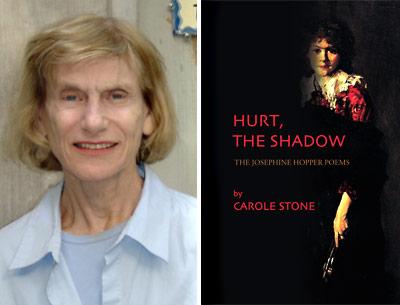There, My Voice

“Hurt, the Shadow”
Carole Stone
Dos Madres Press, $16
The Chilean poet Pablo Neruda famously wrote, “I sang for those who had no voice.” Carole Stone echoes the declaration in her new collection of poems, all of which are written in the imagined voice of Josephine Hopper. Ms. Hopper studied at the New York School of Art and was a painter her entire life, yet, as Lee Krasner did Jackson Pollock, she married a painter, Edward Hopper.
The preface to “Hurt, the Shadow” explains how a poetic persona serves in the collection as a mouthpiece for Josephine Hopper to talk about her own paintings, yet the majority of the poems play with a fascinating bit of history. After their marriage, Ms. Hopper became her husband’s sole artist model and had a strong influence on his work as a whole. “The Josephine Hopper Poems,” as the book’s subtitle calls them, are tantalizingly written in the voice of the woman behind, and inside, Edward Hopper’s most famous paintings.
It gets even better. Whatever your familiarity with either of the Hoppers’ work, it suffices to know that husband and wife regularly invented female characters to appear in his paintings. Josephine, as model, would dress and act out the roles, while Edward brought them to life on the canvas. This loads the written page with more meaning than meets the eye and accounts for a humorous form of unwritten dialogue. Take the opening poem, “Campground in the Battle of Washington Square, 1947”:
Ed’s the great artist.
Look again, you see a life,
(I almost said wife) needing a touch
of sentiment. He thinks
I can only do flowers?
I’ll give him flowers,
gentians, poppies,
I fill my studio with them.
Josephine Hopper speaks about one of her own paintings, lending the poem its title, and deftly unpacks the thematic subtext of the collection. Why has the work of great women in history been overshadowed by the work of great men in proximity? (Clara and Robert Schumann, Elizabeth and Robert Browning, Mary and Percy Shelley come to mind as other examples, though they are countless.) The poem plays with the ambivalent dynamic between partners in life and work, yet remains focused on flowers as symbols of defiance, nicely paralleled with a lyrical edge.
Ms. Stone animates the tension and vitality of her subject matter with nuanced precision. The poet carefully puts finishing touches on the lives of husband and wife, artist and model, woman and self. The latter dichotomy shines in a deceptively simple tone.
He lets on to be humble,
he is not.
I never wanted
to emulate him.
My sheer white curtains
undulate.
“Edward Hopper Reading Robert Frost, 1955” says it all about being in a loving relationship. There is the other, whom we often place above ourselves, until the towering colossus eventually falls, and we must claim our own “curtains that undulate.” It’s a doubly potent image, distinguishing the work of Josephine Hopper from that of her husband, who did not paint undulations, but stark-lit facades. And it reveals the poet’s gift for economical lines, remarkable for their metaphoric conclusions.
Part of the joy in reading “Hurt, the Shadow” is feeling how each poem naturally forms an exquisite view. Ms. Stone imparts wisdom quickly and effortlessly, saying more in less. “Sun in an Empty Room, 1963” correlates the subject to things with searing truth:
My loneliness reduced
to this empty room,
its sorrowful walls filled
with light.
The vacancy of my heart.
Hurt, the shadow.
The poems take their titles from actual paintings by either Josephine Hopper or her husband. If you find it is difficult to place your phone aside or power down devices while reading, leave them on for this. It is enriching, if not appropriate, to search and find online, or in a book, images of the paintings that inspired the poems. “Hurt, the Shadow” is an interactive dream come true, where what excites the imagination can be favorably compared to the original.
Lucas Hunt is the author of the poetry collections “Lives” and “Light on the Concrete.” He is the founder and director of Hunt & Light, a new poetry publisher, and lives in Springs.
Carole Stone’s previous collection of poems was “American Rhapsody.” A professor emerita of English at Montclair State University in New Jersey, she lives part time in Springs.
